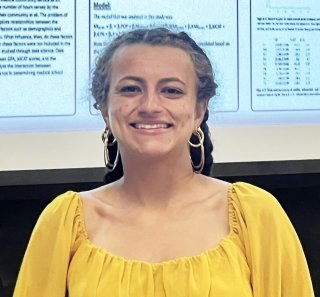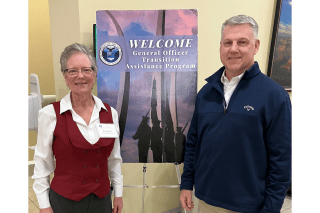Beating calculus like a video game boss
Bloomsburg
Posted

Kaia Morse, a senior mathematics major and chemistry minor, has always found the most complicated calculus to be gratifying. The problems that cause her to think, problems she can’t walk away from, are her favorites. “I love sitting down figuring things out — the feeling of accomplishment from figuring it out is one of the best feelings in the world,” says Morse.
“Correctly solving a hard problem gives me the same dopamine hit as beating a really hard video game stage. This was the most obvious for me when I took Calculus II. Many of the problems had unclear solutions like you would look at the problem, and how you solve it wasn’t obvious. But, once you figured out the different patterns to solve the problem, it became easier,” says Morse. “Similarly, when you’re fighting a video game boss, once you figure out their attack patterns, beating them is easy. In both cases, though, you have to toil with figuring out how to beat them.”
Her love for math started young but developed into a real passion once she figured out what she wanted to go to school for. “I was inspired by my primary care physician,” she says. “He was a mathematics major before he went to medical school, so I wanted to go down a similar path.”
Her passion for mathematics has driven her to excel. During her sophomore year in an upper-level statistics class, Morse researched the statistical variables that affect how students get into medical school. She was so dedicated to her work that she strove to complete it all in one sitting. “I must have started at 7 p.m. and finished it at two in the morning,” Morse says. “I had to get it done in one night. Then, a few years later, I was told to present my work at the conference.”
Her findings show there is no single factor that determines admission to medical school. While the most important factors are the MCAT (Medical College Admission Test) and GPA, admission to medical school is a very holistic process. Other factors contributing to admission include community service, extracurricular activities, and letters of recommendation. The senior shared the results of her regression class research project at the Susquehanna Valley Undergraduate Research Symposium in July. The most notable finding was that while MCAT score and GPA mattered, the size of the population of the applicants' home state also contributed to being accepted into medical school. Her project, “Analyzing the Impact of Factors in Medical School Admission Using Multiple Linear Regression,” was supervised by Dr. Mehdi Razzaghi, professor of mathematics and digital sciences.
The senior appreciates all the support she’s gained from the Commonwealth University – Bloomsburg campus and all the research she has participated in during her time as a student. Starting in the spring semester, Morse plans to research hormonal receptors for cancer with Dr. Michael Borland, professor of biochemistry, chemistry, and physics. After graduation, she plans to attend medical school in the future, specializing in anesthesiology.


